What is Custom Software Development: All to Know


.avif)
Subscribe to our Newsletter
Custom software development isn’t just about creating programs; it’s about solving unique problems and precisely meeting specific business goals. Unlike off-the-shelf software, built for general use, bespoke software solutions are tailored to fit your organization’s processes and requirements.
But what is custom software development, and why is it such a game-changer for companies today?
This blog breaks it down, covering everything from its definition to how it can help you scale your business, improve workflows, and protect sensitive information.
Read on!
What is Custom Software Development?
Custom software development is the creation of tailored software designed around a company’s specific operations, goals, and challenges. It’s not pre-built for mass use. It’s built to meet defined business needs from day one.
Custom software allows teams to define every feature, interaction, and system behavior around how their business actually works. Instead of adjusting workflows to fit a generic tool, companies build software that aligns with internal logic, team structures, and data requirements.
Custom software solutions can improve:
- Efficiency across internal teams
- Integration with existing systems
- All types of generative AI models
- Control over the product design roadmap and priorities
Custom software development agencies are usually used when off-the-shelf solutions fall short, especially for businesses managing complex workflows, growing fast, or operating in regulated spaces.
From web platforms to mobile apps, these solutions are designed with long-term use and scalability in mind.
Working with a software development company gives access to a full team: engineers, designers, architects, and project managers focused on a specific outcome.
This type of custom development is often used for CRM systems, ERP integrations, admin dashboards, and tools that handle data, automation, and core business logic. When properly executed, custom software offers higher ROI, fewer compromises, and better outcomes for users and teams.
Common Examples of Custom Software Solutions
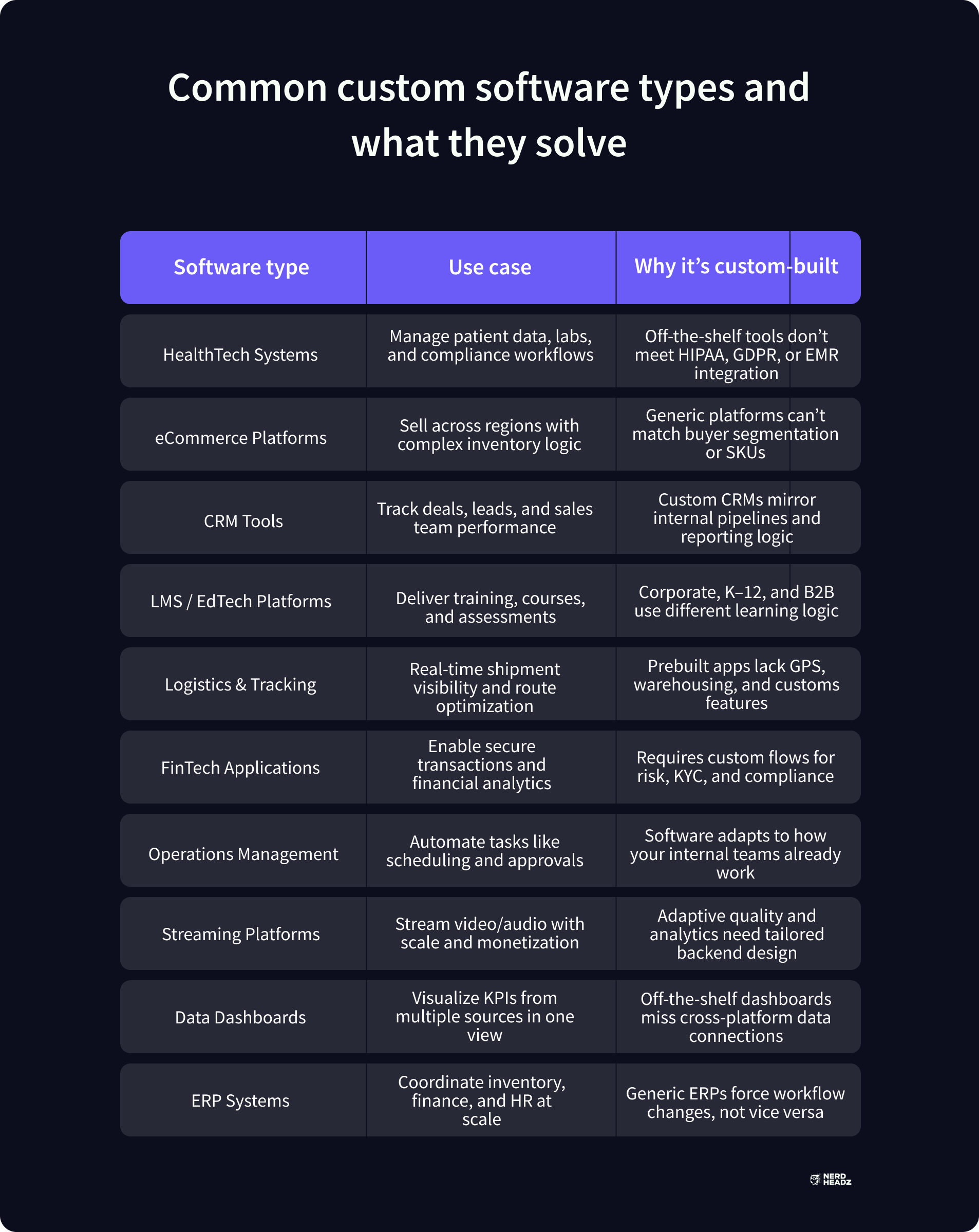
HealthTech Systems
Custom software development is critical in the healthcare industry, allowing systems that manage patient data, lab integrations, compliance workflows, and appointment scheduling with precision.
Off-the-shelf software cannot accommodate region-specific compliance requirements like HIPAA or GDPR or the unique integrations required for legacy EMR systems.
A healthcare-focused software development company can create tailored solutions that include:
- Patient-facing portals and native mobile apps
- Internal dashboards for lab result tracking and care coordination
- Role-based access controls for data security
These systems reduce manual errors, align with evolving compliance needs, and connect seamlessly to third-party health tools, strengthening care quality and internal efficiency.
eCommerce Platforms
Generic eCommerce builders often fall short when it comes to integrating advanced features like custom inventory workflows, multi-store logic, and payment systems across multiple markets.
Custom software development allows businesses to build platforms that directly reflect their sales strategy, regional needs, and product data models.
Teams focused on building custom software in the eCommerce space often design:
- Modular storefronts optimized for different buyer segments
- Personalized recommendation engines powered by user behavior
- Scalable backend systems that handle large SKU volumes
With the right software development partner, eCommerce businesses can streamline operations, automate processes, and build a platform that grows with growing logistics and customer expectations.
Customer Relationship Management (CRM) Tools
A custom CRM system can solve what off-the-shelf software cannot: adapting fully to your sales process, customer journey stages, or integration needs. From enterprise SaaS teams to niche B2B firms, custom CRM development supports faster adoption and clearer reporting by mirroring how teams actually operate.
Custom software development companies in this area typically build:
- Lead and pipeline trackers that match internal deal stages
- Custom software applications for account-based marketing workflows
- Automated reporting systems tailored to board or investor updates
This level of precision eliminates reliance on bloated feature sets and rigid templates.
The result is a CRM system that increases productivity, sharpens targeting, and keeps your business responsive without creating overhead.
Learning Management Systems (LMS) or Edtech
Learning platforms or Edtech, require specific logic based on the audience, corporate training, K–12 classrooms, or B2B onboarding programs. A custom software development company can build LMS tools that support unique learning paths, multilingual content delivery, and user-specific progress tracking.
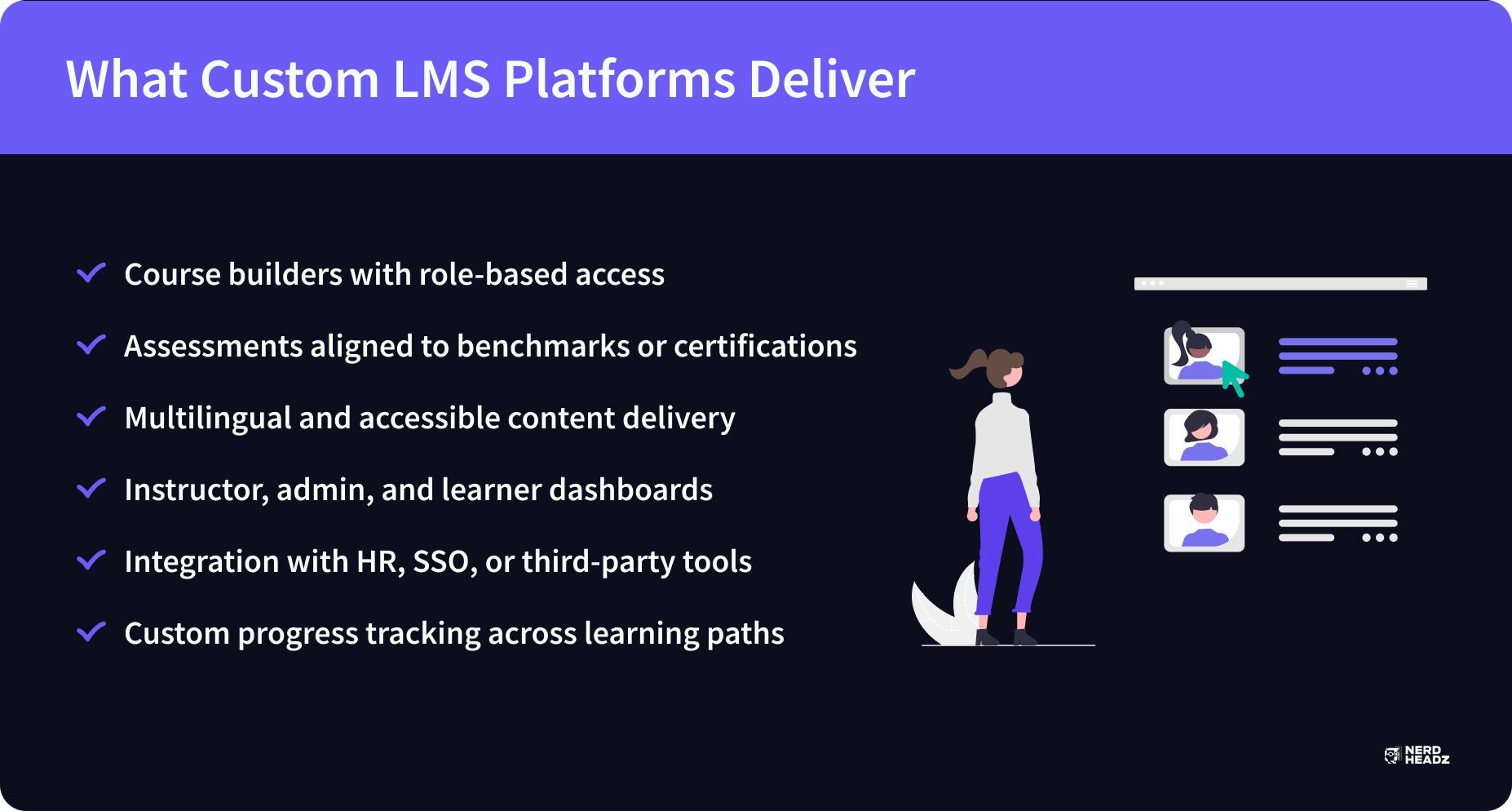
Projects in this category typically include:
- Custom course builders with flexible permissions
- Assessment logic tied to skill benchmarks or compliance requirements
- Dashboards for instructors, administrators, and learners
This type of custom software improves knowledge retention, supports accessibility standards, and eliminates the overhead of adapting off-the-shelf software for long-term use. Development teams often design LMS solutions to integrate with existing systems like HR platforms or single sign-on tools.
Logistics and Real-Time Tracking
Managing inventory, shipments, or supply chain flows in real time requires tailored software solutions. Off-the-shelf logistics platforms often fail to cover route optimization, warehouse-specific logic, or cross-border documentation.
Custom software development offers a practical alternative, helping businesses:
- Track inventory movement and delivery status across multiple zones
- Integrate GPS and sensor data into a centralized dashboard
- Connect with third-party shipping and customs tools
A strong logistics system built through custom development ensures seamless integration with internal platforms, reduces missed deliveries, and creates transparency for customers and operations teams.
FinTech Applications
From lending platforms to financial dashboards, FinTech tools require high levels of precision, security, and user-specific customization. Many off-the-shelf solutions fail to manage risk models, user verification workflows, or multi-currency logic.
Custom software development allows FinTech companies to create systems that support:
- Secure transaction processing and audit logs
- Role-based dashboards for investors, borrowers, and compliance teams
- Integration with bank APIs, KYC tools, and accounting software
Every detail in a FinTech custom solution must be aligned with regulation, user trust, and scalability.
Software development teams in this space focus heavily on system architecture, data encryption, and agile development methodology to build applications that perform at scale while maintaining security and compliance.
Operations Management
Custom software applications help operations teams improve internal workflows, approvals, and resource allocation. Commercial off-the-shelf products usually require teams to adjust their methods to the software's limitations.
By contrast, a software development partner builds tailored solutions designed specifically around existing systems and operational logic.
For example, tailored solutions could automate processes such as inventory control, shift scheduling, or supplier approvals. Custom software offers flexibility, allowing updates to workflows without impacting core system architecture.
Operations gain efficiency and control, directly supporting clear business objectives.
Streaming Platforms
Streaming services have unique technology demands. High performance, scalable infrastructure, and effective content monetization require customized solutions beyond what's typically possible with off-the-shelf software.
A custom software development company works with businesses to define the exact functionalities needed, such as adaptive streaming, real-time analytics, or license management.
Some streaming platforms benefit from tailored recommendation algorithms and detailed audience analytics. Custom software development ensures that these platforms reliably handle large user bases and maintain consistent delivery quality across multiple devices, giving businesses a distinct competitive advantage.
Dashboard & Data Tools
Companies managing complex data sources need more specific dashboard capabilities than most ready-made software solutions provide. Custom software development involves preparing dashboards and analytical tools around a company's particular metrics and reporting requirements.
Dashboards built with custom development methods integrate data from diverse sources, such as ERP systems, customer relationship management software, or supply chain management platforms, into one central, actionable view.
Additionally, tailored solutions provide granular permissions, real-time data visualization, and automated reporting aligned with specific business processes, enhancing team decision-making.
Enterprise Resource Planning (ERP) Systems
ERP software developed specifically for a company can significantly outperform generic ERP solutions, which often demand substantial adjustments to internal business operations. Tailored ERP software aligns directly with a company's unique business processes, departmental integrations, and compliance needs.
A custom software development team will map out precise project scope and select the ideal agile development methodology to address detailed ERP requirements.
Such software integrates smoothly with existing systems, avoids unnecessary complexity, and supports growth. Businesses benefit from ongoing support provided by custom software developers, reducing long-term development costs and improving operational effectiveness.
When Should Companies Build Custom Software?
Custom software has advantages when off-the-shelf products fail to address specific requirements or streamline unique workflows.
The decision to develop custom software generally comes down to addressing clear limitations in existing software solutions or creating a unique competitive advantage.
Businesses experiencing growth or unique operational requirements often find that standard shelf software constrains their ability to scale efficiently. Building custom software resolves these issues by providing tailored software solutions precisely aligned with internal workflows and strategic goals.
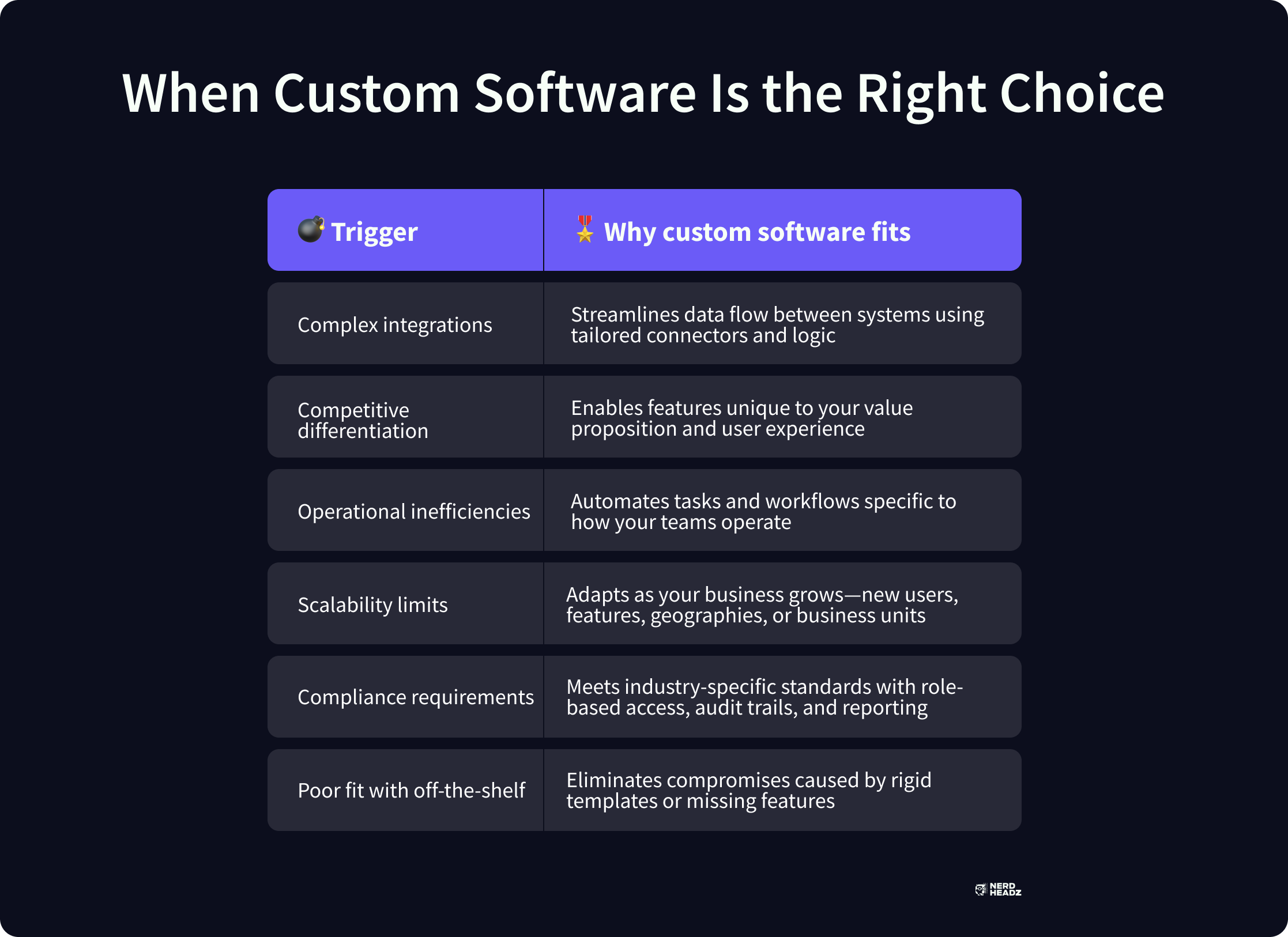
Examples include customer relationship management systems, enterprise resource planning platforms, and specialized mobile apps.
Indicators that custom software development offers clear benefits include:
- Complex integrations: When business operations involve extensive data management or software integration, tailored solutions streamline these workflows.
- Competitive differentiation: Custom-developed software can help a business stand out by enabling features competitors cannot easily replicate.
- Operational efficiency: Tailored software solutions automate processes specific to company requirements, significantly improving productivity and accuracy.
- Scalability: Unlike off-the-shelf solutions, custom software solutions built by an experienced software development team can evolve with company growth.
Before initiating a custom software project, it's crucial to collaborate with a software development partner experienced in your industry. Choosing the right software development services provider ensures projects remain aligned with business needs and budgets.
While initial development costs may be higher, custom-developed software can deliver superior long-term ROI by matching functionality precisely to operational demands and offering ongoing support.
Ultimately, custom software solutions are ideal when precision, flexibility, and scalability directly contribute to a business’s strategic objectives.
Custom Software Development Methodologies
Agile
Agile is a flexible software development model frequently used in custom software development projects. This approach allows software developers to continuously deliver functional software solutions in shorter cycles known as sprints.
The agile methodology emphasizes collaboration between the development team and the client, enabling rapid adjustments to software applications based on changing business needs or market demands.
Unlike shelf software, agile custom software development facilitates ongoing refinements, quick deployment of critical features, and tight alignment with evolving business processes.
Many software development companies prefer Agile for developing custom software, especially for complex projects like enterprise resource planning systems or highly dynamic software integration tasks.
Waterfall
The Waterfall methodology involves a linear and structured development process, clearly defining stages from initial requirements gathering to final deployment.
Custom software developed under Waterfall follows a rigid progression: requirements analysis, system design, software development, testing, and deployment, without overlap or iteration between phases.
Waterfall suits custom software projects where business operations and requirements are stable, clearly defined, and unlikely to change significantly.
Software providers using Waterfall typically offer detailed documentation and comprehensive planning upfront. While less adaptable than Agile, this approach can benefit certain projects, such as bespoke software for regulated industries requiring meticulous compliance documentation, due to its predictability and structured management approach.
Scrum
Scrum is an agile-based software development methodology designed to manage complex software solutions through transparency, frequent inspection, and adaptation.
Custom software development teams adopting Scrum break projects into short iterations called sprints, often lasting one to four weeks, during which specific functionality is developed, tested, and delivered incrementally.
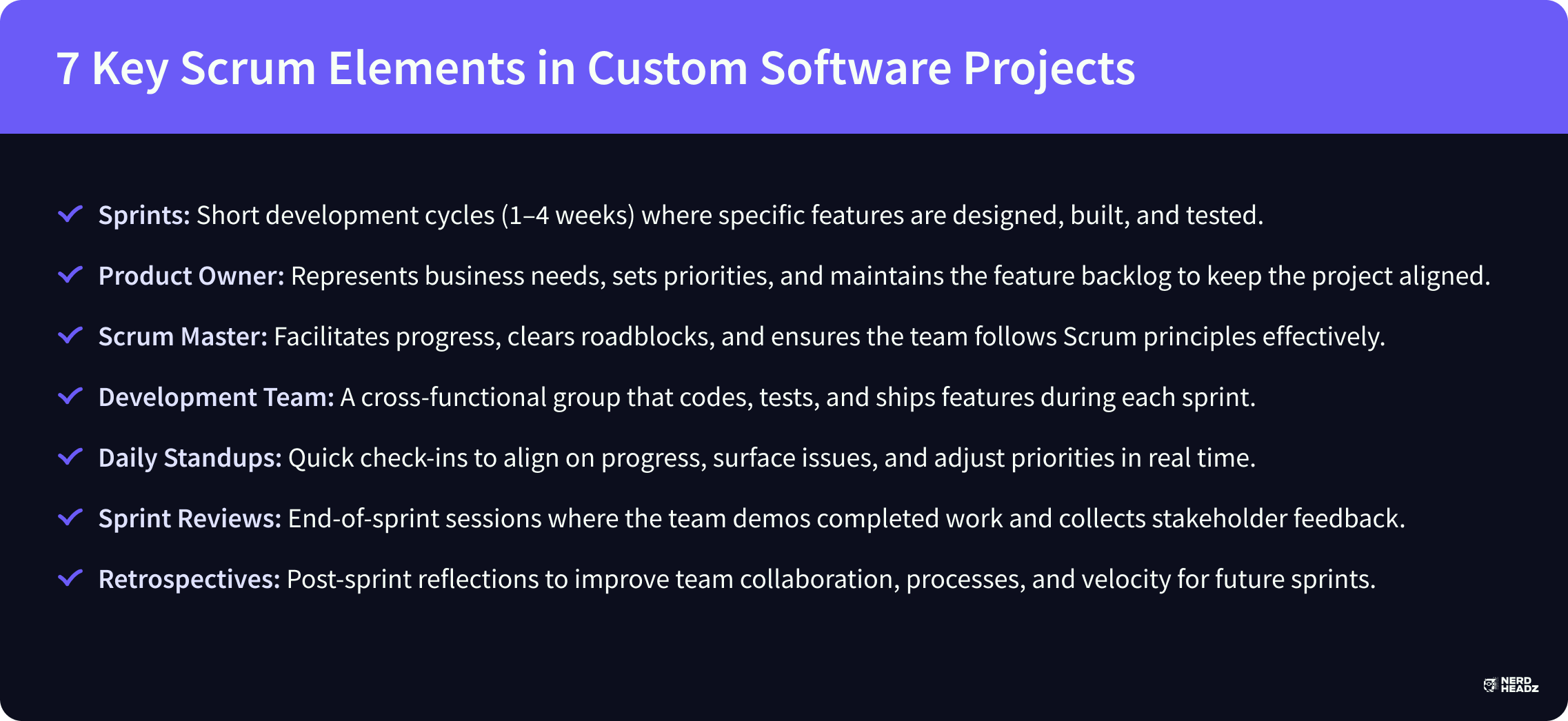
Key roles include:
- Product Owner: Defines business needs, prioritizes features, and manages the project backlog.
- Scrum Master: Facilitates the development process, removes obstacles, and ensures adherence to Scrum principles.
- Development Team: Executes the actual tasks of creating custom software.
This structure helps the software development partner maintain close communication with stakeholders, allowing quick responses to moving requirements or market changes.
For custom software applications with high complexity or uncertainty, such as innovative software integration projects, Scrum offers the flexibility and oversight needed to achieve optimal results while providing ongoing support.
Kanban
Kanban is a visual software development methodology emphasizing continuous workflow management.
Widely adopted in custom software development, Kanban leverages a transparent, card-based system, allowing software developers and stakeholders to clearly see task progress and identify bottlenecks quickly. It focuses on improving business operations by limiting simultaneous tasks and reducing cycle time.
Custom software development teams using Kanban often benefit from faster feedback loops and increased responsiveness.
Unlike traditional project management software, the Kanban approach has fewer defined phases, allowing the development team to release updates continuously and flexibly adapt custom software solutions according to evolving business needs.
Lean
Lean software development applies principles originally developed in manufacturing to reduce waste and optimize efficiency in custom software projects.
The goal is creating custom software that precisely fits user requirements, without unnecessary features or complexity. Lean emphasizes continuous improvement, rapid delivery, and close collaboration with stakeholders throughout the development process.
By eliminating activities that don't directly add value, lean custom software development helps companies reduce cost and accelerate timelines compared to shelf software.
Custom software providers employing Lean prioritize simplicity, maintainability, and clear alignment of software solutions with essential business processes, thereby improving productivity and satisfaction for end-users.
DevOps
DevOps combines software development and operational teams to accelerate custom software deployment and ensure stable releases. This methodology integrates development, testing, and operations into a seamless, automated workflow, enabling custom-developed software to reach users faster and with fewer errors.
In DevOps-driven custom software projects, software developers closely collaborate with IT operations, continuously integrating code and automating deployment processes.
The methodology is especially valuable for complex custom software solutions, such as enterprise apps or software applications requiring frequent updates and software integrations.
A software development partner that uses DevOps ensures rapid delivery and ongoing support, helping businesses achieve consistent, reliable performance from their custom software.
Benefits of Custom Software Development
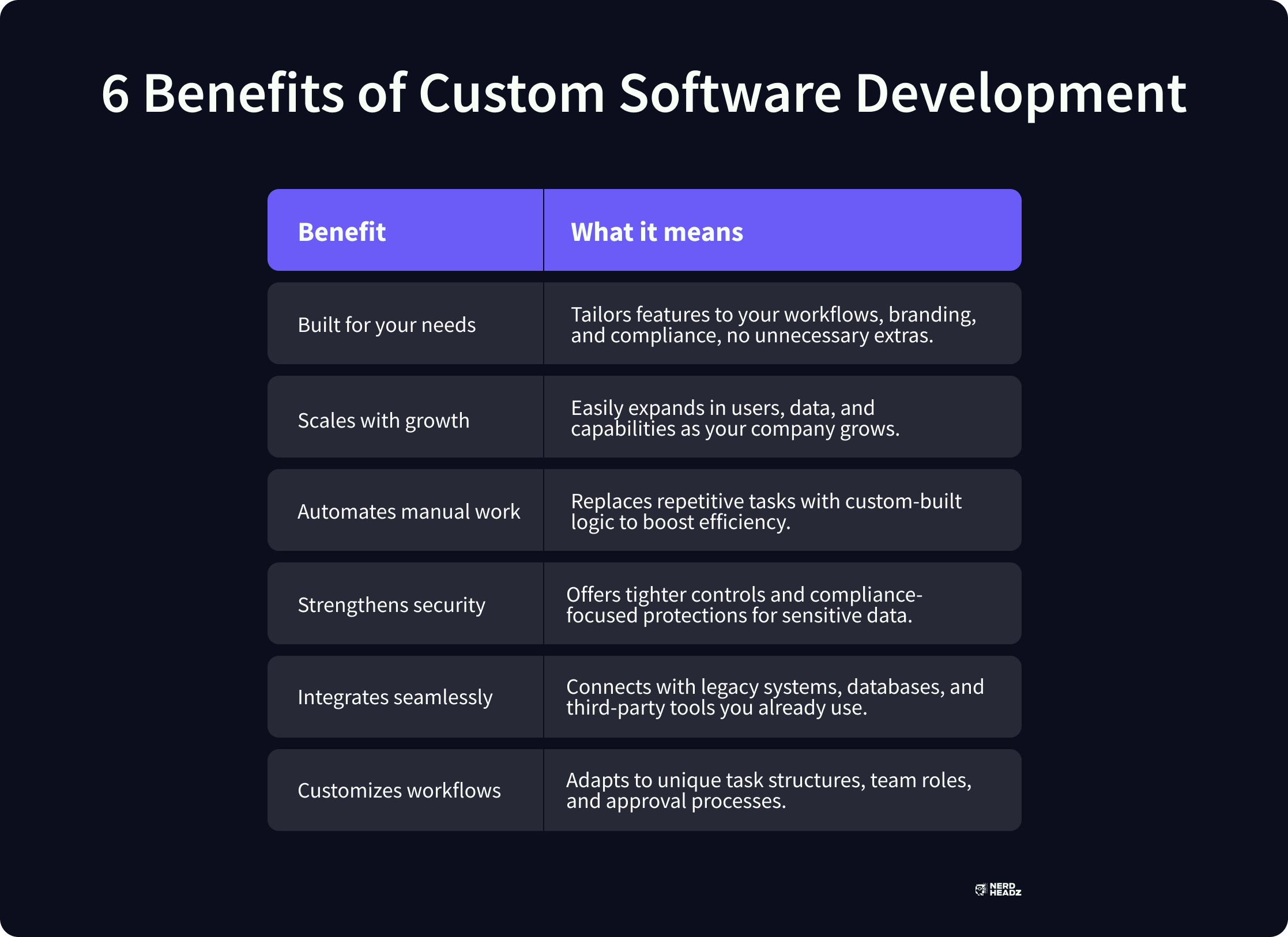
Fits Unique Business Needs
Custom software development tailors solutions to match specific business requirements, making it a clear choice for organizations with unique processes or specialized needs.
Custom software development services highlight the expertise required to create tailored solutions that out-of-the-box software may not provide.
Unlike off-the-shelf software, which is built to accommodate a broad range of users, custom solutions are designed precisely to address particular challenges and ensure a fit with your operations.
One distinct advantage of custom software is its ability to align perfectly with existing workflows.
Need to work with older systems, follow specific compliance rules, or automate a unique process? Tailored solutions give you the flexibility to get it all done your way. For example, businesses can create applications that reflect their branding, incorporate niche functionalities, and prioritize team efficiency.
Additionally, as it is developed for your company, you gain complete control over its features, updates, and improvements while ensuring compatibility with your systems.
Grows With Your Company
Growth is essential for any forward-thinking startup, and custom software supports this evolution by offering scalability and adaptability over time.
Custom software developers consider your future needs from the outset, emphasizing the strategic planning required for a successful custom software development project.
Custom apps grow with your business.
Need new features? More capacity? Extra functionality for a bigger team? Scalability ensures your apps can keep up with your company’s growth.
For instance, a small startup may need a simpler tool initially, but as operations and customer numbers increase, the software can evolve to handle the added workload.
This flexibility also allows companies to change rapidly when necessary. Whether the market introduces new demands or your internal operations require a shift, custom software equips you to adapt without undue disruption.
Automates Repetitive Tasks
Custom software development optimizes time by automating routine tasks that often consume significant resources.
For instance, businesses can design systems to handle repetitive data entry, automatically generate reports, or schedule routine communications without employee intervention. A custom software development company plays a crucial role in creating these tailored automation solutions, ensuring they meet specific business needs.
These automated processes improve accuracy by eliminating human errors, allowing your team to focus on tasks that require creativity and strategic thinking.
Additionally, custom software can integrate seamlessly with existing systems to simplify processes.
For example, an enterprise might design a tool that consolidates information from multiple databases into a single, easy-to-navigate interface. This capability reduces the time spent switching between systems and boosts overall productivity.
The flexibility of these systems allows businesses to scale automation as demands grow.
Protects Sensitive Information
Safeguarding data is more critical than ever, and custom software provides robust tools to address security challenges. Collaborating with a custom software development partner is essential in creating secure solutions.
They can navigate the complexities of software development to ensure compatibility, robustness, and a cohesive user experience.
Custom software includes advanced security features such as role-based access controls, which limit data visibility to authorized personnel. Developers can also incorporate cutting-edge encryption methods into the system architecture, ensuring sensitive information remains safe during storage and transmission.
For example, implementing multi-factor authentication prevents unauthorized access even if a password is compromised.
Businesses in regulated industries, like finance or healthcare, also benefit from compliance-ready software. Developers can include security measures that meet mandatory standards, such as GDPR or HIPAA regulations, ensuring data handling practices adhere to legal and ethical requirements while avoiding potential penalties.
The added security of custom software extends beyond its tailored design. Regular updates and dedicated support ensure systems remain resilient against new threats.
Integrates With Existing Systems
One of the primary advantages of custom software development is its ability to integrate seamlessly with your existing systems.
Whether your business manages legacy platforms, complex databases, or a mixture of third-party tools, custom software development services adapt to align with your current infrastructure.
Custom software can simplify data sharing across platforms, providing a unified source of truth.
For instance, an enterprise might integrate its customer relationship management (CRM) software with its project management tools, automating workflows like updating client data or tracking ongoing projects.
Another significant factor is scalability.
Custom software integrates with older systems while allowing room for future technology upgrades, ensuring adaptability as your business grows.
Improves Workflow Customization
Custom software empowers businesses to tailor workflows based on their unique operational requirements, ensuring that no two processes are treated differently.
Custom software solutions are built to fit your organization’s needs, emphasizing the tailored approach required for workflow optimization.
They help you manage tasks more efficiently and eliminate the roadblocks that come with rigid, one-size-fits-all tools.
For instance, workflow customization allows companies to set up bespoke approval hierarchies, automate specific triggers, and design role-specific dashboards. For example, a sales team might use a tool to automatically route lead notifications to account managers, ensuring no potential customer is overlooked.
Similarly, finance departments may implement automated end-of-month reporting workflows, saving time and reducing human error.
Custom workflow solutions also deliver real-time monitoring and reporting, giving businesses visibility into every process step. Performance metrics and task tracking help identify inefficiencies, allowing companies to optimize procedures as they evolve.
Additionally, these tools integrate features like notifications, task prioritization, and approvals, letting employees focus on strategic objectives.
Challenges of Custom Software Development
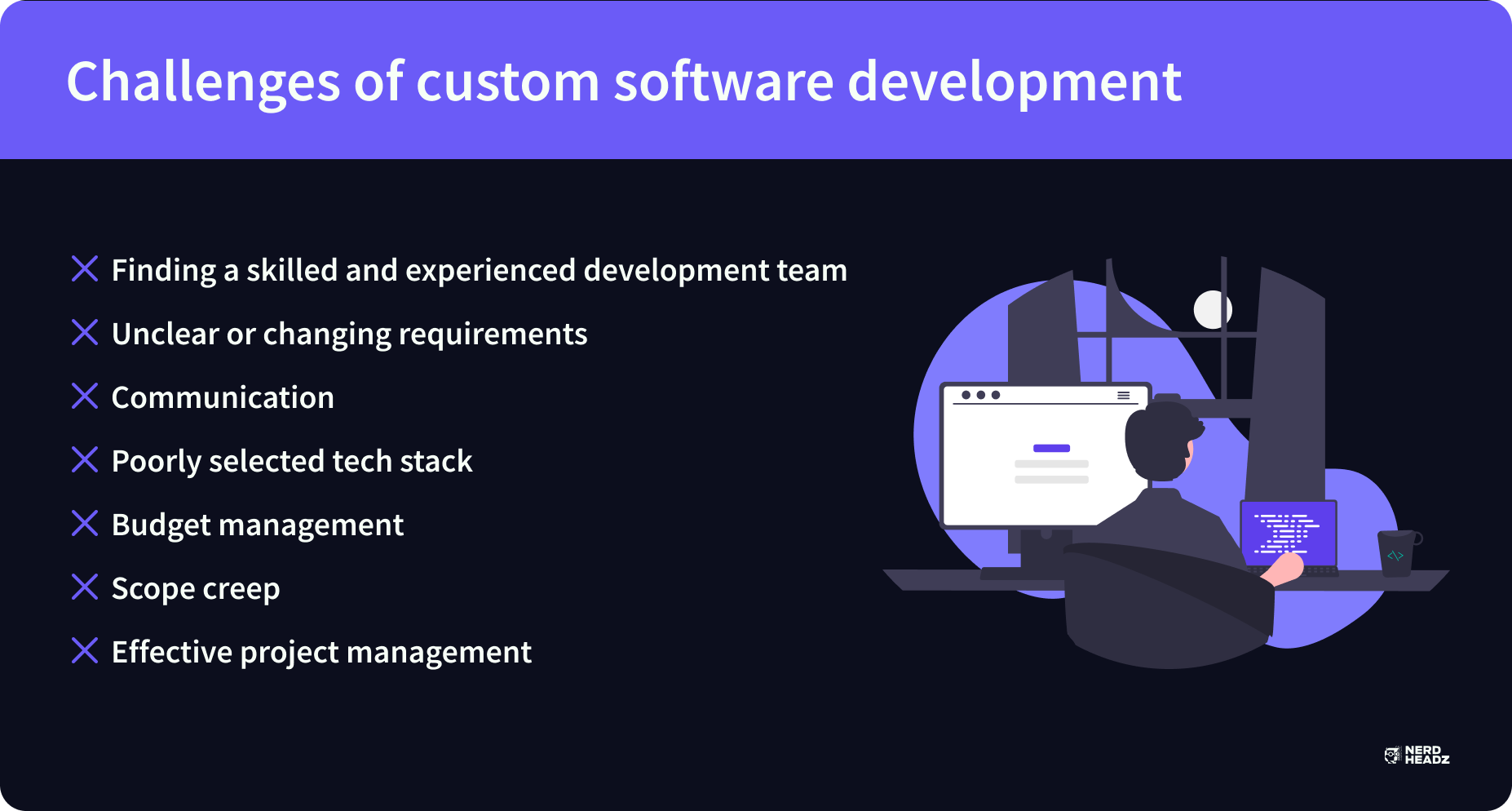
Custom software development allows organizations to design solutions tailored to their unique needs. However, it also presents challenges that require thoughtful planning and strategy to overcome.
Executing a custom software development project demands strategic planning and collaboration to address these challenges effectively.
Finding a skilled and experienced development team is one of the most common hurdles.
Hiring professionals with the right expertise can take time due to the high demand in the industry. A well-matched team is essential for delivering a successful project, and organizations often benefit from partnering with an established software development company or hiring dedicated talent with a proven track record.
Another challenge comes from unclear or changing requirements.
When the project scope isn’t well-defined, teams may find it difficult to deliver results that align with stakeholder expectations. Drafting a detailed software requirements specification document initially helps establish a clear road map.
Furthermore, adopting agile development practices allows teams to manage evolving requirements effectively and adjust priorities to adapt to new objectives.
Communication is another critical factor.
Miscommunication among stakeholders, developers, and clients can lead to delays and misaligned outcomes. To avoid this, it’s important to establish well-defined communication processes, utilize project management tools, and hold regular updates to ensure alignment throughout the development process.
Choosing the most suitable technologies is another area where difficulties can come up.
A poorly selected tech stack can lead to compatibility issues or scalability limitations. Research and consulting with experienced developers to align technology choices with the project’s goals and future needs are essential to ensure long-term success.
Budget management is a persistent challenge. Cost estimates can fluctuate due to unforeseen delays or additional requirements. Incorporating a contingency buffer in the budget and closely monitoring expenses can help prevent financial barriers from stalling the project.
Teams should plan for flexibility and adjust resources effectively to maintain financial control.
Scope creep is another risk in custom development. Without strict boundaries, additional requirements may be introduced during the process, escalating timelines and costs. The scope must be defined initially to avoid unnecessary disruptions, and a strong change management process must be implemented.
Lastly, effective project management is key to keeping the development process on track.
A skilled project manager balances timelines, resources, and deliverables while focusing on achieving the project’s objectives. This role is crucial for mitigating risks and overcoming obstacles that may arise.
How Much Does it Cost to Make Custom Software?
Custom software development can be a significant investment, and the cost varies widely depending on the project’s complexity, size, and specific needs. Therefore, it is important to address the exact needs when making a budget for software development.
The cost of developing an app typically depends on various factors, including the type of software, features, and time required.
A small application with limited pages and basic functionality might cost between $10,000 and $50,000, while a medium-sized solution integrating some legacy systems or additional features may range from $50,000 to $200,000. Larger, enterprise-grade systems with extensive features, high scalability, and advanced integrations often exceed $400,000.
Several aspects influence these costs.
For example, the number of screens or pages impacts the coding effort; systems with more interfaces naturally take more time and resources.
Similarly, the complexity of the software, such as incorporating logic-heavy features like data analysis or advanced algorithms, can increase expenses due to the added work required for testing and implementation.
The design of the software also plays a role.
Visual elements like tailored fonts, unique color schemes, or advanced animations contribute to the cost but enhance usability and branding. Design fees might constitute 15-25% of the total project cost.
Integration with existing systems is another factor to consider.
While connecting with well-documented solutions like payment gateways is relatively straightforward, custom integrations with older or less common platforms can be labor-intensive. Data migration, where information from an existing system is transferred to the new platform, further adds to the expense due to the need for custom scripts and thorough testing to ensure accuracy.
The development team’s location and expertise also impact pricing.
Developers in North America often command higher rates, ranging from $50 to $200 per hour, whereas teams in regions like Eastern Europe or Asia may offer lower rates, typically between $20 and $80 per hour.
However, businesses must weigh lower costs against factors like time zone differences, communication, and alignment with project goals.
How the Custom Software Development Process Works
Understanding Client Requirements
The first critical step in custom software development is understanding client needs.
This involves more than just gathering a list of desired features; it’s about truly understanding the business goals, challenges, and processes the software solution must address. A custom software development company plays a crucial role in this phase by working closely with stakeholders to uncover the functionalities required and the objectives driving the project.
To achieve this, thorough discussions and workshops with the client are essential.
These sessions help identify pain points, priorities, and opportunities for improvement within the organization.
Documenting these findings in a requirements list or project specification is also crucial. This document acts as a guide throughout development while minimizing the risk of miscommunication. It ensures teams are aligned on expectations, avoiding pitfalls like scope changes or unclear objectives later in the process.
Stakeholder input is invaluable here.
Feedback from end users who will use the software daily provides insights that can shape intuitive and productive solutions.
Planning and Solution Design
Once client requirements have been identified, planning and solution design guide the transformation of those needs into a workable blueprint.
This stage ensures that all elements of the custom software solution are feasible, scalable, and aligned with organizational goals. Collaborating with a custom software development partner is crucial at this stage, as they can navigate the complexities of software development, ensuring compatibility, robustness, and a cohesive user experience.
Meticulous planning significantly reduces the chance of errors or inefficiencies during development.
Solution design involves breaking down high-level requirements into actionable technical components. Developers focus on system architecture, integration points, and user experience. These considerations ensure a seamless mix of functionality, usability, and scalability for future growth.
Diagrams and prototypes may be created to visualize the solution during this process. These tools allow stakeholders to see how the software looks and functions, helping them catch issues early and adjust accordingly.
Collaboration between system architects, developers, and stakeholders is key.
Solution design minimizes future disruptions by addressing variables like technology stack, project scope, and potential constraints upfront. It also involves carefully evaluating how the software will interact with existing systems and processes, ensuring a smooth integration.
Development and Integration
Building and integrating systems form the backbone of functionality during the custom software development process.
Developers transform the requirements established earlier into operational code. This stage focuses on shaping features and ensuring they align well with user needs and technological constraints. Strategic planning is crucial for a successful custom software development project, ensuring the development and integration phases are meticulously executed.
Integration plays a key role here.
Seamless compatibility is essential whether you’re merging new software with existing applications or incorporating third-party tools. Proper integration reduces inefficiencies and helps streamline business processes.
For instance, bridging older systems with newly developed software can extend the life of legacy platforms while adding modern capabilities. Throughout this phase, collaboration between developers and IT teams ensures smooth transitions and minimizes disruptions.
Testing and Launch
Before custom software becomes user-ready, it must undergo rigorous testing phases.
Quality Assurance (QA) is identifying and addressing potential issues. This process includes unit testing for individual components, integration testing to ensure systems interact correctly, and user acceptance testing to confirm that the solution meets its intended purpose.
Custom software development services require expertise in these testing phases to ensure a successful launch.
After thorough testing, the next step is launch.
Rolling out software to production environments often requires careful planning to avoid downtime or compatibility issues. For larger systems, deployment may proceed in phases, reducing risks while allowing gradual user adaptation.
Developers monitor performance after the launch to ensure all systems function as expected.
Maintenance and Support
Launching software does not mark the end of the software development lifecycle; it is just the beginning of ongoing maintenance and support.
Businesses rely on these practices to keep applications secure, efficient, and adaptable to evolving needs. A custom software development company is crucial for providing this ongoing support and ensuring that software remains functional and up to date.
Maintenance and support usually include addressing bugs, optimizing performance, or adapting software to changes in operational requirements.
Support ensures users get the assistance they need when encountering issues. This could involve troubleshooting errors, providing guidance, or implementing feature updates over time.
Preventive measures like system audits, updates, and documentation also play a part in maintaining functionality.
How To Outsource Custom Software Development Projects?
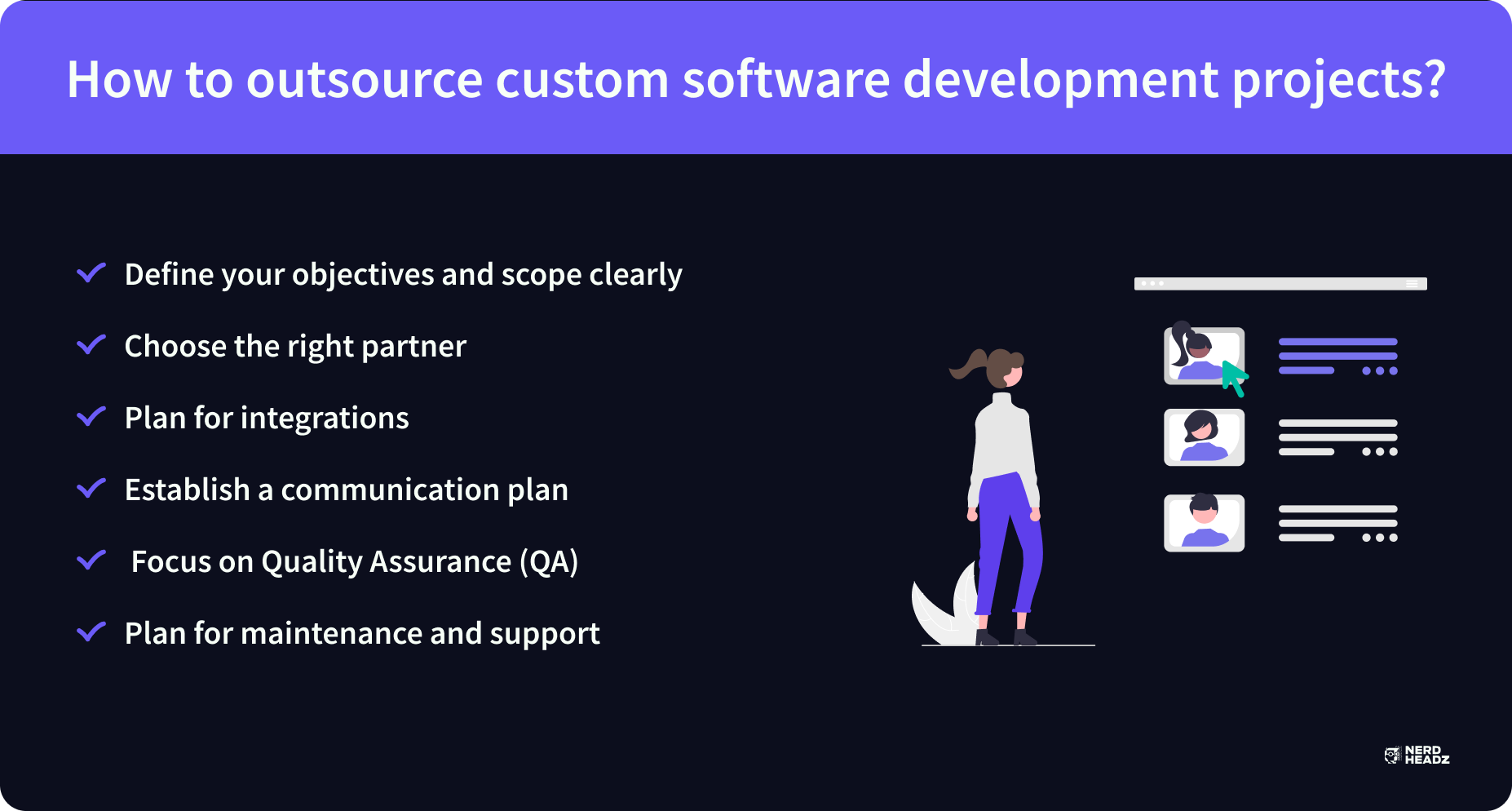
Outsourcing custom software development can be a strategic move for businesses aiming to leverage expertise and scale efficiently.
However, the process requires careful planning to achieve the desired results. At NerdHeadz, we provide software development services tailored to your unique needs, ensuring seamless execution while respecting your vision. Therefore, it is crucial to select a trustworthy software development company.
NerdHeadz creates reliable, scalable, and customized software while maintaining constant communication. Evaluate the partner’s experience, portfolio, and technology stack to ensure it aligns with your needs.
Custom software often needs to work with existing systems or third-party tools. The integration process demands expertise to ensure smooth compatibility without disrupting operations.
Effective communication is essential for any outsourced project.
Use project management tools and set regular meetings to review progress, address challenges, and maintain a strong feedback loop.
Outsourcing with the right development team can transform your business and optimize workflows.
Whether building new software or improving existing systems, NerdHeadz is the partner you can rely on for expert-driven, customized software solutions backed by continuous support.
Conclusion
Custom software development is the key to differentiating between generic functionalities and specific business demands.
By reading this blog, you’ve gained insight into what makes custom solutions invaluable, offering scalability, seamless integration, and alignment with your organization’s goals.
If your business is ready to move beyond one-size-fits-all tools and invest in software built just for you. Partnering with experts who understand your unique challenges can make all the difference.
At NerdHeadz, we specialize in crafting solutions that fit your vision, enhancing efficiency while delivering long-term value.
Get in touch with us today to start building the software your business truly deserves.
Frequently asked questions
What is the concept of custom software development?

Custom software development creates software explicitly designed to address a business’s or user’s unique needs, ensuring a perfect fit for their requirements.
What is the power of custom software development?

The power lies in its ability to provide tailored solutions, simplify processes, and adapt to the evolving needs of a business, giving it a competitive edge.
What are the benefits of custom application development?

Custom applications offer flexibility, scalability, better integration with your systems, and a solution tailored to your exact needs, boosting efficiency and performance.
How many types of custom software are there?

Custom software can vary widely, but depending on business needs, common types include enterprise applications, mobile apps, web solutions, CRM systems, and e-commerce platforms.

Luciani Woestemeier
Luciani Zorrilla is a content marketer with experience in sales development, outbound sales, SEO, design, email marketing, and UX. She stands out in driving sustainable growth for tech startups through impactful SEO strategies and leading results-oriented marketing teams.
Related Articles
Subscribe to our Newsletter
.webp)
.webp)
Are you ready to talk about your project?
Schedule a consultation with our team, and we’ll send a custom proposal.


Custom software development isn’t just about creating programs; it’s about solving unique problems and precisely meeting specific business goals. Unlike off-the-shelf software, built for general use, bespoke software solutions are tailored to fit your organization’s processes and requirements.
But what is custom software development, and why is it such a game-changer for companies today?
This blog breaks it down, covering everything from its definition to how it can help you scale your business, improve workflows, and protect sensitive information.
Read on!
What is Custom Software Development?
Custom software development is the creation of tailored software designed around a company’s specific operations, goals, and challenges. It’s not pre-built for mass use. It’s built to meet defined business needs from day one.
Custom software allows teams to define every feature, interaction, and system behavior around how their business actually works. Instead of adjusting workflows to fit a generic tool, companies build software that aligns with internal logic, team structures, and data requirements.
Custom software solutions can improve:
- Efficiency across internal teams
- Integration with existing systems
- All types of generative AI models
- Control over the product design roadmap and priorities
Custom software development agencies are usually used when off-the-shelf solutions fall short, especially for businesses managing complex workflows, growing fast, or operating in regulated spaces.
From web platforms to mobile apps, these solutions are designed with long-term use and scalability in mind.
Working with a software development company gives access to a full team: engineers, designers, architects, and project managers focused on a specific outcome.
This type of custom development is often used for CRM systems, ERP integrations, admin dashboards, and tools that handle data, automation, and core business logic. When properly executed, custom software offers higher ROI, fewer compromises, and better outcomes for users and teams.
Common Examples of Custom Software Solutions

HealthTech Systems
Custom software development is critical in the healthcare industry, allowing systems that manage patient data, lab integrations, compliance workflows, and appointment scheduling with precision.
Off-the-shelf software cannot accommodate region-specific compliance requirements like HIPAA or GDPR or the unique integrations required for legacy EMR systems.
A healthcare-focused software development company can create tailored solutions that include:
- Patient-facing portals and native mobile apps
- Internal dashboards for lab result tracking and care coordination
- Role-based access controls for data security
These systems reduce manual errors, align with evolving compliance needs, and connect seamlessly to third-party health tools, strengthening care quality and internal efficiency.
eCommerce Platforms
Generic eCommerce builders often fall short when it comes to integrating advanced features like custom inventory workflows, multi-store logic, and payment systems across multiple markets.
Custom software development allows businesses to build platforms that directly reflect their sales strategy, regional needs, and product data models.
Teams focused on building custom software in the eCommerce space often design:
- Modular storefronts optimized for different buyer segments
- Personalized recommendation engines powered by user behavior
- Scalable backend systems that handle large SKU volumes
With the right software development partner, eCommerce businesses can streamline operations, automate processes, and build a platform that grows with growing logistics and customer expectations.
Customer Relationship Management (CRM) Tools
A custom CRM system can solve what off-the-shelf software cannot: adapting fully to your sales process, customer journey stages, or integration needs. From enterprise SaaS teams to niche B2B firms, custom CRM development supports faster adoption and clearer reporting by mirroring how teams actually operate.
Custom software development companies in this area typically build:
- Lead and pipeline trackers that match internal deal stages
- Custom software applications for account-based marketing workflows
- Automated reporting systems tailored to board or investor updates
This level of precision eliminates reliance on bloated feature sets and rigid templates.
The result is a CRM system that increases productivity, sharpens targeting, and keeps your business responsive without creating overhead.
Learning Management Systems (LMS) or Edtech
Learning platforms or Edtech, require specific logic based on the audience, corporate training, K–12 classrooms, or B2B onboarding programs. A custom software development company can build LMS tools that support unique learning paths, multilingual content delivery, and user-specific progress tracking.

Projects in this category typically include:
- Custom course builders with flexible permissions
- Assessment logic tied to skill benchmarks or compliance requirements
- Dashboards for instructors, administrators, and learners
This type of custom software improves knowledge retention, supports accessibility standards, and eliminates the overhead of adapting off-the-shelf software for long-term use. Development teams often design LMS solutions to integrate with existing systems like HR platforms or single sign-on tools.
Logistics and Real-Time Tracking
Managing inventory, shipments, or supply chain flows in real time requires tailored software solutions. Off-the-shelf logistics platforms often fail to cover route optimization, warehouse-specific logic, or cross-border documentation.
Custom software development offers a practical alternative, helping businesses:
- Track inventory movement and delivery status across multiple zones
- Integrate GPS and sensor data into a centralized dashboard
- Connect with third-party shipping and customs tools
A strong logistics system built through custom development ensures seamless integration with internal platforms, reduces missed deliveries, and creates transparency for customers and operations teams.
FinTech Applications
From lending platforms to financial dashboards, FinTech tools require high levels of precision, security, and user-specific customization. Many off-the-shelf solutions fail to manage risk models, user verification workflows, or multi-currency logic.
Custom software development allows FinTech companies to create systems that support:
- Secure transaction processing and audit logs
- Role-based dashboards for investors, borrowers, and compliance teams
- Integration with bank APIs, KYC tools, and accounting software
Every detail in a FinTech custom solution must be aligned with regulation, user trust, and scalability.
Software development teams in this space focus heavily on system architecture, data encryption, and agile development methodology to build applications that perform at scale while maintaining security and compliance.
Operations Management
Custom software applications help operations teams improve internal workflows, approvals, and resource allocation. Commercial off-the-shelf products usually require teams to adjust their methods to the software's limitations.
By contrast, a software development partner builds tailored solutions designed specifically around existing systems and operational logic.
For example, tailored solutions could automate processes such as inventory control, shift scheduling, or supplier approvals. Custom software offers flexibility, allowing updates to workflows without impacting core system architecture.
Operations gain efficiency and control, directly supporting clear business objectives.
Streaming Platforms
Streaming services have unique technology demands. High performance, scalable infrastructure, and effective content monetization require customized solutions beyond what's typically possible with off-the-shelf software.
A custom software development company works with businesses to define the exact functionalities needed, such as adaptive streaming, real-time analytics, or license management.
Some streaming platforms benefit from tailored recommendation algorithms and detailed audience analytics. Custom software development ensures that these platforms reliably handle large user bases and maintain consistent delivery quality across multiple devices, giving businesses a distinct competitive advantage.
Dashboard & Data Tools
Companies managing complex data sources need more specific dashboard capabilities than most ready-made software solutions provide. Custom software development involves preparing dashboards and analytical tools around a company's particular metrics and reporting requirements.
Dashboards built with custom development methods integrate data from diverse sources, such as ERP systems, customer relationship management software, or supply chain management platforms, into one central, actionable view.
Additionally, tailored solutions provide granular permissions, real-time data visualization, and automated reporting aligned with specific business processes, enhancing team decision-making.
Enterprise Resource Planning (ERP) Systems
ERP software developed specifically for a company can significantly outperform generic ERP solutions, which often demand substantial adjustments to internal business operations. Tailored ERP software aligns directly with a company's unique business processes, departmental integrations, and compliance needs.
A custom software development team will map out precise project scope and select the ideal agile development methodology to address detailed ERP requirements.
Such software integrates smoothly with existing systems, avoids unnecessary complexity, and supports growth. Businesses benefit from ongoing support provided by custom software developers, reducing long-term development costs and improving operational effectiveness.
When Should Companies Build Custom Software?
Custom software has advantages when off-the-shelf products fail to address specific requirements or streamline unique workflows.
The decision to develop custom software generally comes down to addressing clear limitations in existing software solutions or creating a unique competitive advantage.
Businesses experiencing growth or unique operational requirements often find that standard shelf software constrains their ability to scale efficiently. Building custom software resolves these issues by providing tailored software solutions precisely aligned with internal workflows and strategic goals.

Examples include customer relationship management systems, enterprise resource planning platforms, and specialized mobile apps.
Indicators that custom software development offers clear benefits include:
- Complex integrations: When business operations involve extensive data management or software integration, tailored solutions streamline these workflows.
- Competitive differentiation: Custom-developed software can help a business stand out by enabling features competitors cannot easily replicate.
- Operational efficiency: Tailored software solutions automate processes specific to company requirements, significantly improving productivity and accuracy.
- Scalability: Unlike off-the-shelf solutions, custom software solutions built by an experienced software development team can evolve with company growth.
Before initiating a custom software project, it's crucial to collaborate with a software development partner experienced in your industry. Choosing the right software development services provider ensures projects remain aligned with business needs and budgets.
While initial development costs may be higher, custom-developed software can deliver superior long-term ROI by matching functionality precisely to operational demands and offering ongoing support.
Ultimately, custom software solutions are ideal when precision, flexibility, and scalability directly contribute to a business’s strategic objectives.
Custom Software Development Methodologies
Agile
Agile is a flexible software development model frequently used in custom software development projects. This approach allows software developers to continuously deliver functional software solutions in shorter cycles known as sprints.
The agile methodology emphasizes collaboration between the development team and the client, enabling rapid adjustments to software applications based on changing business needs or market demands.
Unlike shelf software, agile custom software development facilitates ongoing refinements, quick deployment of critical features, and tight alignment with evolving business processes.
Many software development companies prefer Agile for developing custom software, especially for complex projects like enterprise resource planning systems or highly dynamic software integration tasks.
Waterfall
The Waterfall methodology involves a linear and structured development process, clearly defining stages from initial requirements gathering to final deployment.
Custom software developed under Waterfall follows a rigid progression: requirements analysis, system design, software development, testing, and deployment, without overlap or iteration between phases.
Waterfall suits custom software projects where business operations and requirements are stable, clearly defined, and unlikely to change significantly.
Software providers using Waterfall typically offer detailed documentation and comprehensive planning upfront. While less adaptable than Agile, this approach can benefit certain projects, such as bespoke software for regulated industries requiring meticulous compliance documentation, due to its predictability and structured management approach.
Scrum
Scrum is an agile-based software development methodology designed to manage complex software solutions through transparency, frequent inspection, and adaptation.
Custom software development teams adopting Scrum break projects into short iterations called sprints, often lasting one to four weeks, during which specific functionality is developed, tested, and delivered incrementally.

Key roles include:
- Product Owner: Defines business needs, prioritizes features, and manages the project backlog.
- Scrum Master: Facilitates the development process, removes obstacles, and ensures adherence to Scrum principles.
- Development Team: Executes the actual tasks of creating custom software.
This structure helps the software development partner maintain close communication with stakeholders, allowing quick responses to moving requirements or market changes.
For custom software applications with high complexity or uncertainty, such as innovative software integration projects, Scrum offers the flexibility and oversight needed to achieve optimal results while providing ongoing support.
Kanban
Kanban is a visual software development methodology emphasizing continuous workflow management.
Widely adopted in custom software development, Kanban leverages a transparent, card-based system, allowing software developers and stakeholders to clearly see task progress and identify bottlenecks quickly. It focuses on improving business operations by limiting simultaneous tasks and reducing cycle time.
Custom software development teams using Kanban often benefit from faster feedback loops and increased responsiveness.
Unlike traditional project management software, the Kanban approach has fewer defined phases, allowing the development team to release updates continuously and flexibly adapt custom software solutions according to evolving business needs.
Lean
Lean software development applies principles originally developed in manufacturing to reduce waste and optimize efficiency in custom software projects.
The goal is creating custom software that precisely fits user requirements, without unnecessary features or complexity. Lean emphasizes continuous improvement, rapid delivery, and close collaboration with stakeholders throughout the development process.
By eliminating activities that don't directly add value, lean custom software development helps companies reduce cost and accelerate timelines compared to shelf software.
Custom software providers employing Lean prioritize simplicity, maintainability, and clear alignment of software solutions with essential business processes, thereby improving productivity and satisfaction for end-users.
DevOps
DevOps combines software development and operational teams to accelerate custom software deployment and ensure stable releases. This methodology integrates development, testing, and operations into a seamless, automated workflow, enabling custom-developed software to reach users faster and with fewer errors.
In DevOps-driven custom software projects, software developers closely collaborate with IT operations, continuously integrating code and automating deployment processes.
The methodology is especially valuable for complex custom software solutions, such as enterprise apps or software applications requiring frequent updates and software integrations.
A software development partner that uses DevOps ensures rapid delivery and ongoing support, helping businesses achieve consistent, reliable performance from their custom software.
Benefits of Custom Software Development

Fits Unique Business Needs
Custom software development tailors solutions to match specific business requirements, making it a clear choice for organizations with unique processes or specialized needs.
Custom software development services highlight the expertise required to create tailored solutions that out-of-the-box software may not provide.
Unlike off-the-shelf software, which is built to accommodate a broad range of users, custom solutions are designed precisely to address particular challenges and ensure a fit with your operations.
One distinct advantage of custom software is its ability to align perfectly with existing workflows.
Need to work with older systems, follow specific compliance rules, or automate a unique process? Tailored solutions give you the flexibility to get it all done your way. For example, businesses can create applications that reflect their branding, incorporate niche functionalities, and prioritize team efficiency.
Additionally, as it is developed for your company, you gain complete control over its features, updates, and improvements while ensuring compatibility with your systems.
Grows With Your Company
Growth is essential for any forward-thinking startup, and custom software supports this evolution by offering scalability and adaptability over time.
Custom software developers consider your future needs from the outset, emphasizing the strategic planning required for a successful custom software development project.
Custom apps grow with your business.
Need new features? More capacity? Extra functionality for a bigger team? Scalability ensures your apps can keep up with your company’s growth.
For instance, a small startup may need a simpler tool initially, but as operations and customer numbers increase, the software can evolve to handle the added workload.
This flexibility also allows companies to change rapidly when necessary. Whether the market introduces new demands or your internal operations require a shift, custom software equips you to adapt without undue disruption.
Automates Repetitive Tasks
Custom software development optimizes time by automating routine tasks that often consume significant resources.
For instance, businesses can design systems to handle repetitive data entry, automatically generate reports, or schedule routine communications without employee intervention. A custom software development company plays a crucial role in creating these tailored automation solutions, ensuring they meet specific business needs.
These automated processes improve accuracy by eliminating human errors, allowing your team to focus on tasks that require creativity and strategic thinking.
Additionally, custom software can integrate seamlessly with existing systems to simplify processes.
For example, an enterprise might design a tool that consolidates information from multiple databases into a single, easy-to-navigate interface. This capability reduces the time spent switching between systems and boosts overall productivity.
The flexibility of these systems allows businesses to scale automation as demands grow.
Protects Sensitive Information
Safeguarding data is more critical than ever, and custom software provides robust tools to address security challenges. Collaborating with a custom software development partner is essential in creating secure solutions.
They can navigate the complexities of software development to ensure compatibility, robustness, and a cohesive user experience.
Custom software includes advanced security features such as role-based access controls, which limit data visibility to authorized personnel. Developers can also incorporate cutting-edge encryption methods into the system architecture, ensuring sensitive information remains safe during storage and transmission.
For example, implementing multi-factor authentication prevents unauthorized access even if a password is compromised.
Businesses in regulated industries, like finance or healthcare, also benefit from compliance-ready software. Developers can include security measures that meet mandatory standards, such as GDPR or HIPAA regulations, ensuring data handling practices adhere to legal and ethical requirements while avoiding potential penalties.
The added security of custom software extends beyond its tailored design. Regular updates and dedicated support ensure systems remain resilient against new threats.
Integrates With Existing Systems
One of the primary advantages of custom software development is its ability to integrate seamlessly with your existing systems.
Whether your business manages legacy platforms, complex databases, or a mixture of third-party tools, custom software development services adapt to align with your current infrastructure.
Custom software can simplify data sharing across platforms, providing a unified source of truth.
For instance, an enterprise might integrate its customer relationship management (CRM) software with its project management tools, automating workflows like updating client data or tracking ongoing projects.
Another significant factor is scalability.
Custom software integrates with older systems while allowing room for future technology upgrades, ensuring adaptability as your business grows.
Improves Workflow Customization
Custom software empowers businesses to tailor workflows based on their unique operational requirements, ensuring that no two processes are treated differently.
Custom software solutions are built to fit your organization’s needs, emphasizing the tailored approach required for workflow optimization.
They help you manage tasks more efficiently and eliminate the roadblocks that come with rigid, one-size-fits-all tools.
For instance, workflow customization allows companies to set up bespoke approval hierarchies, automate specific triggers, and design role-specific dashboards. For example, a sales team might use a tool to automatically route lead notifications to account managers, ensuring no potential customer is overlooked.
Similarly, finance departments may implement automated end-of-month reporting workflows, saving time and reducing human error.
Custom workflow solutions also deliver real-time monitoring and reporting, giving businesses visibility into every process step. Performance metrics and task tracking help identify inefficiencies, allowing companies to optimize procedures as they evolve.
Additionally, these tools integrate features like notifications, task prioritization, and approvals, letting employees focus on strategic objectives.
Challenges of Custom Software Development

Custom software development allows organizations to design solutions tailored to their unique needs. However, it also presents challenges that require thoughtful planning and strategy to overcome.
Executing a custom software development project demands strategic planning and collaboration to address these challenges effectively.
Finding a skilled and experienced development team is one of the most common hurdles.
Hiring professionals with the right expertise can take time due to the high demand in the industry. A well-matched team is essential for delivering a successful project, and organizations often benefit from partnering with an established software development company or hiring dedicated talent with a proven track record.
Another challenge comes from unclear or changing requirements.
When the project scope isn’t well-defined, teams may find it difficult to deliver results that align with stakeholder expectations. Drafting a detailed software requirements specification document initially helps establish a clear road map.
Furthermore, adopting agile development practices allows teams to manage evolving requirements effectively and adjust priorities to adapt to new objectives.
Communication is another critical factor.
Miscommunication among stakeholders, developers, and clients can lead to delays and misaligned outcomes. To avoid this, it’s important to establish well-defined communication processes, utilize project management tools, and hold regular updates to ensure alignment throughout the development process.
Choosing the most suitable technologies is another area where difficulties can come up.
A poorly selected tech stack can lead to compatibility issues or scalability limitations. Research and consulting with experienced developers to align technology choices with the project’s goals and future needs are essential to ensure long-term success.
Budget management is a persistent challenge. Cost estimates can fluctuate due to unforeseen delays or additional requirements. Incorporating a contingency buffer in the budget and closely monitoring expenses can help prevent financial barriers from stalling the project.
Teams should plan for flexibility and adjust resources effectively to maintain financial control.
Scope creep is another risk in custom development. Without strict boundaries, additional requirements may be introduced during the process, escalating timelines and costs. The scope must be defined initially to avoid unnecessary disruptions, and a strong change management process must be implemented.
Lastly, effective project management is key to keeping the development process on track.
A skilled project manager balances timelines, resources, and deliverables while focusing on achieving the project’s objectives. This role is crucial for mitigating risks and overcoming obstacles that may arise.
How Much Does it Cost to Make Custom Software?
Custom software development can be a significant investment, and the cost varies widely depending on the project’s complexity, size, and specific needs. Therefore, it is important to address the exact needs when making a budget for software development.
The cost of developing an app typically depends on various factors, including the type of software, features, and time required.
A small application with limited pages and basic functionality might cost between $10,000 and $50,000, while a medium-sized solution integrating some legacy systems or additional features may range from $50,000 to $200,000. Larger, enterprise-grade systems with extensive features, high scalability, and advanced integrations often exceed $400,000.
Several aspects influence these costs.
For example, the number of screens or pages impacts the coding effort; systems with more interfaces naturally take more time and resources.
Similarly, the complexity of the software, such as incorporating logic-heavy features like data analysis or advanced algorithms, can increase expenses due to the added work required for testing and implementation.
The design of the software also plays a role.
Visual elements like tailored fonts, unique color schemes, or advanced animations contribute to the cost but enhance usability and branding. Design fees might constitute 15-25% of the total project cost.
Integration with existing systems is another factor to consider.
While connecting with well-documented solutions like payment gateways is relatively straightforward, custom integrations with older or less common platforms can be labor-intensive. Data migration, where information from an existing system is transferred to the new platform, further adds to the expense due to the need for custom scripts and thorough testing to ensure accuracy.
The development team’s location and expertise also impact pricing.
Developers in North America often command higher rates, ranging from $50 to $200 per hour, whereas teams in regions like Eastern Europe or Asia may offer lower rates, typically between $20 and $80 per hour.
However, businesses must weigh lower costs against factors like time zone differences, communication, and alignment with project goals.
How the Custom Software Development Process Works
Understanding Client Requirements
The first critical step in custom software development is understanding client needs.
This involves more than just gathering a list of desired features; it’s about truly understanding the business goals, challenges, and processes the software solution must address. A custom software development company plays a crucial role in this phase by working closely with stakeholders to uncover the functionalities required and the objectives driving the project.
To achieve this, thorough discussions and workshops with the client are essential.
These sessions help identify pain points, priorities, and opportunities for improvement within the organization.
Documenting these findings in a requirements list or project specification is also crucial. This document acts as a guide throughout development while minimizing the risk of miscommunication. It ensures teams are aligned on expectations, avoiding pitfalls like scope changes or unclear objectives later in the process.
Stakeholder input is invaluable here.
Feedback from end users who will use the software daily provides insights that can shape intuitive and productive solutions.
Planning and Solution Design
Once client requirements have been identified, planning and solution design guide the transformation of those needs into a workable blueprint.
This stage ensures that all elements of the custom software solution are feasible, scalable, and aligned with organizational goals. Collaborating with a custom software development partner is crucial at this stage, as they can navigate the complexities of software development, ensuring compatibility, robustness, and a cohesive user experience.
Meticulous planning significantly reduces the chance of errors or inefficiencies during development.
Solution design involves breaking down high-level requirements into actionable technical components. Developers focus on system architecture, integration points, and user experience. These considerations ensure a seamless mix of functionality, usability, and scalability for future growth.
Diagrams and prototypes may be created to visualize the solution during this process. These tools allow stakeholders to see how the software looks and functions, helping them catch issues early and adjust accordingly.
Collaboration between system architects, developers, and stakeholders is key.
Solution design minimizes future disruptions by addressing variables like technology stack, project scope, and potential constraints upfront. It also involves carefully evaluating how the software will interact with existing systems and processes, ensuring a smooth integration.
Development and Integration
Building and integrating systems form the backbone of functionality during the custom software development process.
Developers transform the requirements established earlier into operational code. This stage focuses on shaping features and ensuring they align well with user needs and technological constraints. Strategic planning is crucial for a successful custom software development project, ensuring the development and integration phases are meticulously executed.
Integration plays a key role here.
Seamless compatibility is essential whether you’re merging new software with existing applications or incorporating third-party tools. Proper integration reduces inefficiencies and helps streamline business processes.
For instance, bridging older systems with newly developed software can extend the life of legacy platforms while adding modern capabilities. Throughout this phase, collaboration between developers and IT teams ensures smooth transitions and minimizes disruptions.
Testing and Launch
Before custom software becomes user-ready, it must undergo rigorous testing phases.
Quality Assurance (QA) is identifying and addressing potential issues. This process includes unit testing for individual components, integration testing to ensure systems interact correctly, and user acceptance testing to confirm that the solution meets its intended purpose.
Custom software development services require expertise in these testing phases to ensure a successful launch.
After thorough testing, the next step is launch.
Rolling out software to production environments often requires careful planning to avoid downtime or compatibility issues. For larger systems, deployment may proceed in phases, reducing risks while allowing gradual user adaptation.
Developers monitor performance after the launch to ensure all systems function as expected.
Maintenance and Support
Launching software does not mark the end of the software development lifecycle; it is just the beginning of ongoing maintenance and support.
Businesses rely on these practices to keep applications secure, efficient, and adaptable to evolving needs. A custom software development company is crucial for providing this ongoing support and ensuring that software remains functional and up to date.
Maintenance and support usually include addressing bugs, optimizing performance, or adapting software to changes in operational requirements.
Support ensures users get the assistance they need when encountering issues. This could involve troubleshooting errors, providing guidance, or implementing feature updates over time.
Preventive measures like system audits, updates, and documentation also play a part in maintaining functionality.
How To Outsource Custom Software Development Projects?

Outsourcing custom software development can be a strategic move for businesses aiming to leverage expertise and scale efficiently.
However, the process requires careful planning to achieve the desired results. At NerdHeadz, we provide software development services tailored to your unique needs, ensuring seamless execution while respecting your vision. Therefore, it is crucial to select a trustworthy software development company.
NerdHeadz creates reliable, scalable, and customized software while maintaining constant communication. Evaluate the partner’s experience, portfolio, and technology stack to ensure it aligns with your needs.
Custom software often needs to work with existing systems or third-party tools. The integration process demands expertise to ensure smooth compatibility without disrupting operations.
Effective communication is essential for any outsourced project.
Use project management tools and set regular meetings to review progress, address challenges, and maintain a strong feedback loop.
Outsourcing with the right development team can transform your business and optimize workflows.
Whether building new software or improving existing systems, NerdHeadz is the partner you can rely on for expert-driven, customized software solutions backed by continuous support.
Conclusion
Custom software development is the key to differentiating between generic functionalities and specific business demands.
By reading this blog, you’ve gained insight into what makes custom solutions invaluable, offering scalability, seamless integration, and alignment with your organization’s goals.
If your business is ready to move beyond one-size-fits-all tools and invest in software built just for you. Partnering with experts who understand your unique challenges can make all the difference.
At NerdHeadz, we specialize in crafting solutions that fit your vision, enhancing efficiency while delivering long-term value.
Get in touch with us today to start building the software your business truly deserves.

Luciani Zorrilla is a content marketer with experience in sales development, outbound sales, SEO, design, email marketing, and UX. She stands out in driving sustainable growth for tech startups through impactful SEO strategies and leading results-oriented marketing teams.

%201.svg)

%201.svg)
%201.webp)

%201.webp)
.png)







